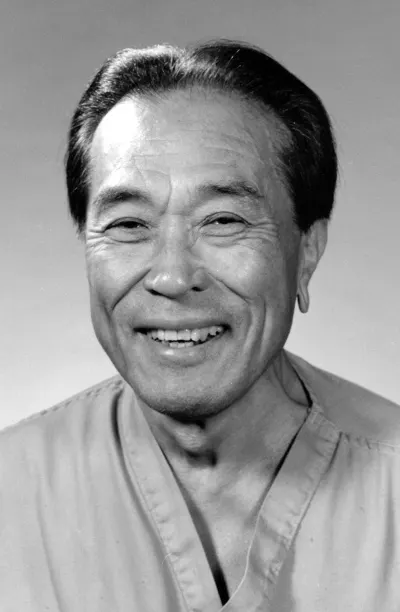 | Dr. Juhn A. Wada was professor emeritus in the Department of Psychiatry and Neurosciences at the UBC Faculty of Medicine and an officer of the Order of Canada. A luminary and guiding light for generations of epileptologists and basic scientists he has mentored a longtime colleague and friend, and an innovative pioneer in translational epilepsy research and of human brain asymmetries. Dr. Wada's illustrious career began in Japan shortly after the end of World War II. He studied medicine at Hokkaido University, qualifying as a Doctor of Medicine in 1946 and qualifying as a Doctor of Medical Science in 1950. He was assistant professor of neurology and psychiatry at Hokkaido University when he made the seminal discovery that a barbiturate could be safely injected into the carotid artery of patients, anesthetizing one hemisphere of the brain so that the other could be tested independently.
|
For the first time it was possible to determine, unequivocally, which hemisphere was dominant for language. Dr. Wada pursued this line of work at the Montreal Neurological Institute in 1955, where he developed the procedure known as a Wada test. This test was then modified to assess memory and became the most reliable means to determine whether surgical resection of one temporal lobe can be safely performed without causing global amnesia. Temporal lobe resection is the most common surgical therapy for drug-resistant epilepsy and the Wada test remains an essential component of the pre-surgical evaluation.
Dr. Wada then moved to the University of British Columbia (UBC) in 1956, where he established their epilepsy center and directed it until his retirement. In addition to clinical care and clinical research, Dr. Wada also established a laboratory for animal research into the basic mechanisms of epilepsy. He became a pioneer in the utilization of an animal model of epilepsy called “kindling” which permitted controlled studies of the development of epilepsy in the laboratory. Dr. Wada quickly became the most productive neuroscientist of the field and, for many years, kindling was the most important approach for basic research on epilepsy. Dr. Wada’s research described fundamental mechanisms of kindling in a variety of animals, from rats to monkeys and baboons, that had important implications for diagnosis, treatment, and prevention of epilepsy in humans. For the rest of Dr. Wada’s productive career, Vancouver was in the center of kindling research, and many of the subsequent leaders in this work were trained by him. He was particularly proud that he was privileged to have worked with nearly sixty young neuroscientists while at UBC, many of whom later served as presidents in various national neurological, neurosurgical and psychiatric societies as well as many more who became full professors and department heads in their chosen fields. The list of his mentees extends beyond UBC and includes both of us, who benefited from his thoughtful guidance and support.
Over his career, Dr. Wada edited 11 books and published over 300 papers on human brain asymmetry, the neurobiology of epilepsy and kindling. He organized many conferences worldwide including the first 4 kindling symposia later published as individual volumes. An invitation to a kindling symposium was considered as a seminal event in a researcher’s career, despite the fact that the participants stayed in the dormitory of UBC under spartan conditions. During the symposium, the participants not only presented their work but also actively participated in discussions that are an integral part of published volumes. He also organized the 10th International Epilepsy Congress in Vancouver. As funding was tight, he took out a second mortgage on his home to support this endeavor, which was highly successful. Dr. Wada received many awards and honors: in addition to being an Officer of the Order of Canada; he received the Order of the Sacred Treasure, Gold and Silver Star, Japan; the Wilder Penfield Gold Medal from the Canadian League Against Epilepsy, the William G. Lennox Award from the American Epilepsy Society, the Herbert H. Jasper Award from the American Clinical Neurophysiology Society and the Lifetime Achievement Award from the International League Against Epilepsy and the International Bureau for Epilepsy. He has served as President of the American Clinical Neurophysiology Society (formerly known as the American EEG Society); he was the first non-American President of the American Epilepsy Society; and the founding President of the Canadian Epilepsy Society.
Dr. Wada projected an authoritative, but always humble demeanor, and epitomized the well-rounded scholar; his interests in art and humanity included writing, painting, and poetry. He mastered the art of watercolor and some of his paintings have been made into note cards. He began to study piano after his retirement and was very proud that he could play several sonatas. A collection of his medical writings in Japanese between 1965 to 2004 was published as a book titled “Kitano Tanashii-The spirit of North in Japanese”. Dr. Wada greatly appreciated his adoptive homeland of Canada, and was known for enclosing maple leaves in his letters, until e-mail rendered this form of communication obsolete.
Dr. Wada’s selfless commitment to patients with epilepsy, and his scientific contributions, have helped to reduce the impact of epilepsy on their quality of life. Throughout his long productive career, he impressed upon his colleagues and friends his enthusiasm for learning, his eagerness to share knowledge, and his determination to offer the best possible care for patients while simultaneously advancing the science of translational research.
Dr. Wada enjoyed an extraordinarily full and rich life that spanned almost a century; he stands as a role model for all of us.
Solomon L. Moshé, Professor
Albert Einstein College of Medicine, Bronx NY, USA
ORCID ID: 0000-0001-9427-9476
Jerome Engel Jr, Professor
UCLA, Los Angeles, CA, USA
ORCID ID: 0000-0001-6324-5716
More here.